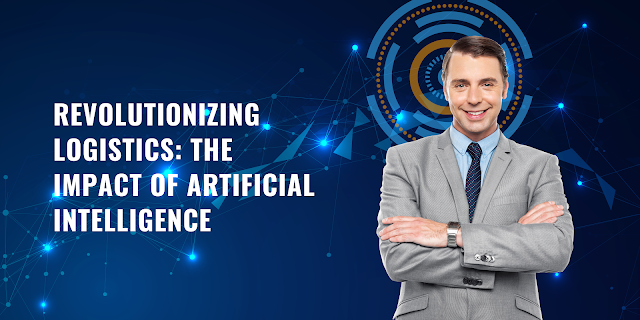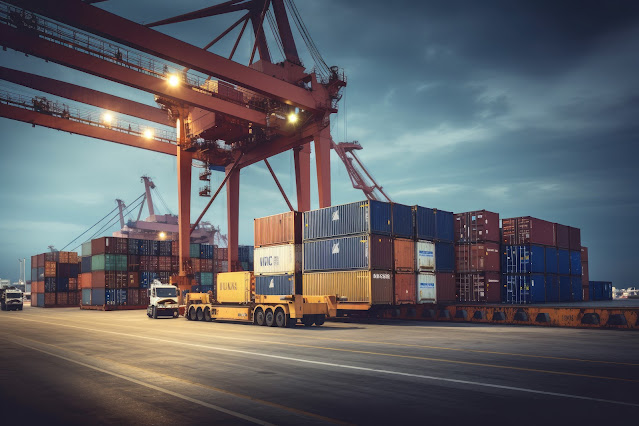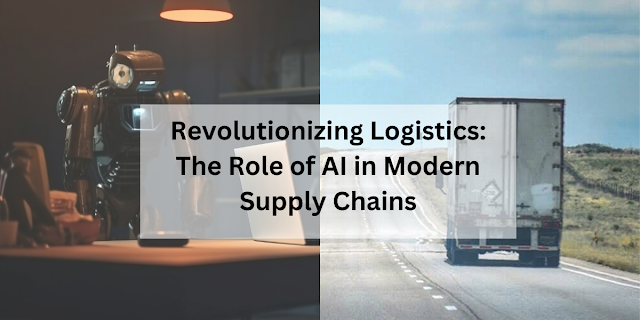Revolutionizing Logistics: The Impact of Artificial Intelligence
In today's fast-paced world, logistics is the backbone of global commerce. The efficient movement of goods from manufacturers to consumers is essential for businesses to thrive and for consumers to access the products they need. As the digital age continues to evolve, Artificial Intelligence (AI) is playing a pivotal role in revolutionizing the logistics industry. From optimizing supply chains to enhancing last-mile delivery, AI is reshaping every facet of logistics operations. In this blog, we'll explore how AI is transforming logistics in a multitude of ways.
1. Enhanced Route Optimization:
One of the most critical aspects of logistics is optimizing the routes for transporting goods. AI-driven algorithms analyze a myriad of factors, including traffic data, weather conditions, and historical delivery routes, to generate the most efficient routes for delivery trucks. This not only saves time but also reduces fuel consumption, ultimately reducing costs and minimizing the environmental impact.
2. Predictive Maintenance:
AI algorithms can predict when vehicles and equipment are likely to fail by analyzing data from sensors and historical maintenance records. This predictive maintenance approach ensures that breakdowns are less likely to occur, reducing downtime and keeping goods flowing smoothly through the supply chain.
3. Inventory Management:
AI-powered inventory management systems utilize data analytics and machine learning to optimize inventory levels. These systems can predict demand patterns, detect fluctuations in real-time, and automatically reorder stock when needed. As a result, businesses can reduce carrying costs, prevent stockouts, and improve overall supply chain efficiency.
4. Demand Forecasting:
AI can analyze historical sales data, market trends, and external factors like holidays and economic conditions to predict future demand accurately. This enables companies to stock inventory more effectively, meet customer demands, and reduce overstocking or understocking issues.
5. Warehouse Automation:
The implementation of AI-driven robots and autonomous vehicles in warehouses has revolutionized the way goods are stored, picked, and packed. These robots can work alongside human workers or even operate independently to increase efficiency and reduce human error. With AI, warehouses can operate 24/7, further speeding up order fulfillment.
6. Customer Experience Improvement:
AI chatbots and virtual assistants are being used to enhance customer service in logistics. These systems can provide real-time updates on delivery status, answer customer queries, and even facilitate returns and refunds, improving overall customer satisfaction.
7. Last-Mile Delivery Optimization:
The "last mile" is often the most expensive and challenging part of the delivery process. AI is transforming last-mile delivery through the use of drones and autonomous delivery vehicles. These technologies can navigate urban environments more efficiently, reduce delivery times, and lower delivery costs.
8. Risk Management:
AI can assess and mitigate risks in the supply chain by continuously monitoring and analyzing data. Whether it's identifying potential disruptions due to geopolitical events, natural disasters, or supplier issues, AI enables companies to proactively manage risks and develop contingency plans.
9. Sustainability and Environmental Impact:
Reducing the carbon footprint of logistics is a growing concern for businesses and consumers alike. AI helps optimize transportation routes, leading to reduced fuel consumption and emissions. Furthermore, AI can assist in the transition to electric and autonomous vehicles, further reducing the environmental impact of logistics operations.
10. Cost Reduction:
Ultimately, AI-driven logistics solutions translate into cost savings. By improving efficiency, reducing errors, and optimizing operations, companies can lower their operating costs, which can be passed on to consumers or reinvested into further technological advancements.
In conclusion, Artificial Intelligence is ushering in a new era of logistics that is more efficient, cost-effective, and environmentally friendly. From route optimization to last-mile delivery, AI is making every step of the supply chain smarter and more responsive to the demands of a rapidly changing world. As AI continues to evolve, the logistics industry will undoubtedly see even more transformative changes, making logistics faster, more reliable, and more sustainable than ever before. Companies that embrace AI in their logistics operations will not only survive but thrive in this dynamic and highly competitive market.
Also Read- Revolutionizing Logistics: The Role of AI in Modern Supply Chains




Comments
Post a Comment